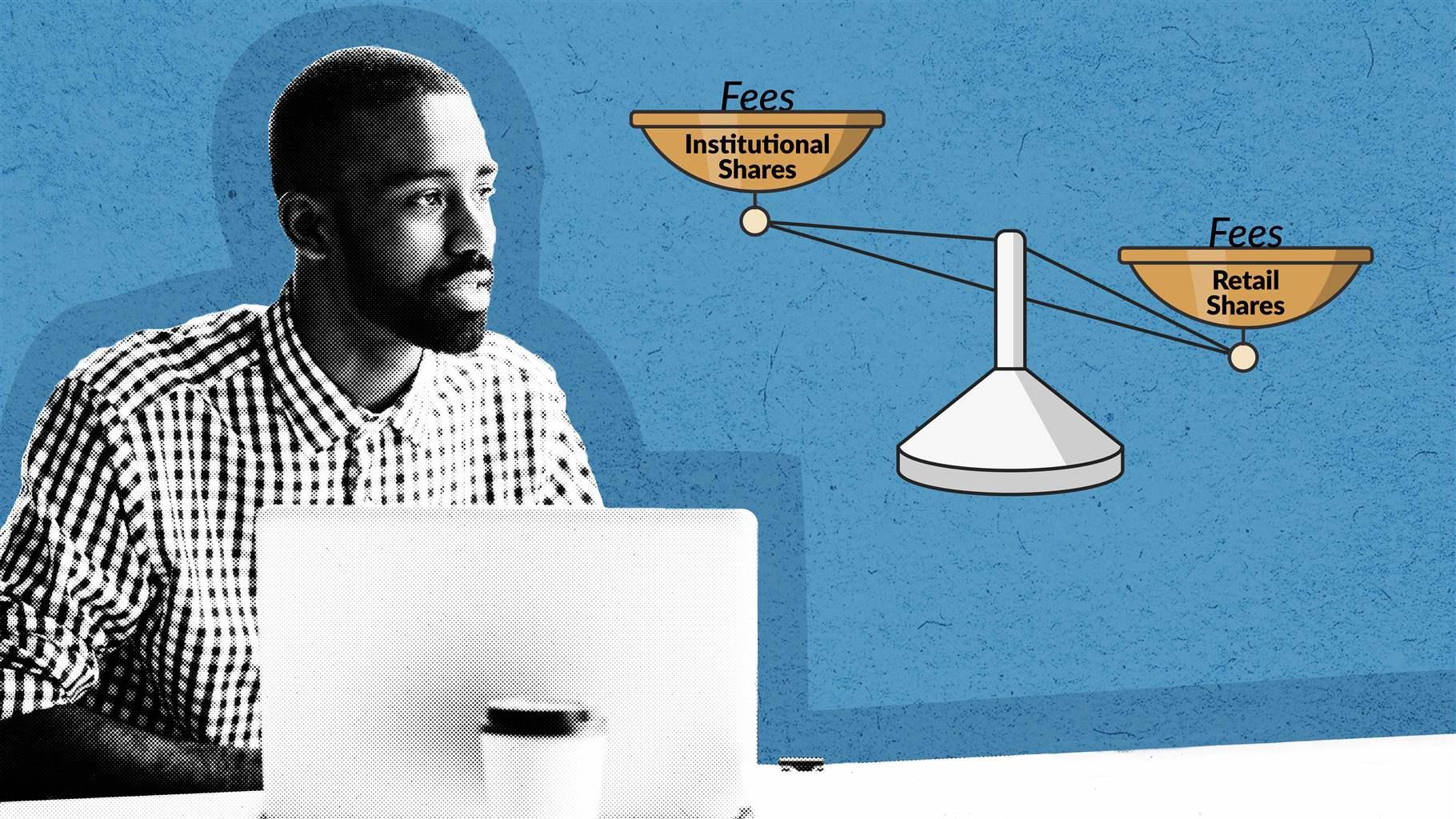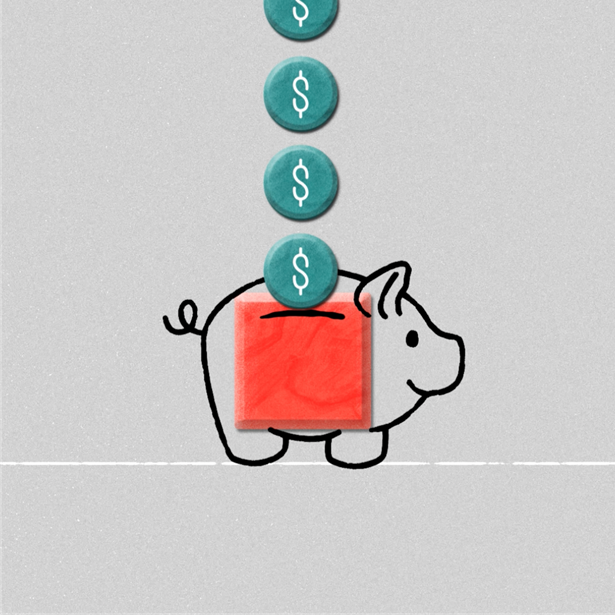Mutual Fund Expenses Can Cut Into Investors’ Retirement Savings
Scorecard highlights most and least expensive management companies by investment type

How people invest during their working years can have a big impact on how much they accumulate for retirement. For example, when leaving a job, workers may have to decide whether to leave their savings in an employer-sponsored retirement plan such as a 401(k) or roll it into an individual retirement account (IRA). But they often make these decisions without a good sense of the fees charged by the companies managing the funds, costs generally tied to the type of shares workers own.
Mutual funds have share classes that charge different amounts depending on how they are sold to each type of investor, particularly whether the shares are held by individuals using their own savings—retail investors—or institutions investing on behalf of others. Institutional investors, including employer-sponsored retirement plans, can leverage their purchasing power to access lower fee shares.
In a recent issue brief, “Small Differences in Mutual Fund Fees Can Cut Billions From Americans’ Retirement Savings,” The Pew Charitable Trusts calculated the differences between median institutional and retail share class expense ratios across all mutual funds that offered at least one institutional share and at least one retail share in 2019. The expense ratio represents the annual expense to shareholders as a percentage of the value of the assets held. Based on those calculations, the brief illustrates the potential costs to retirement savings for those who roll their assets from a workplace 401(k) into an IRA.
This scorecard identifies the most expensive and least expensive mutual fund management companies, ranked by each company’s average fund-level asset-weighted expense ratio for both institutional and retail shares.
Pew generated separate lists by investment asset type. Each shows the management companies with the 10 highest-average expenses and 10 lowest-average expenses relative to the median. Click on the name of the asset type in the following list to see the scorecard:
- Equity mutual funds (investments are primarily individual company stocks).
- Hybrid mutual funds (investments include both equities and bonds).
- Bond mutual funds (investments are primarily fixed-income securities, such as government bonds).
Methodology
The analysis of mutual fund annual expenses uses 2019 data from the Survivor-Bias-Free U.S. Mutual Fund Database, available from the Center for Research in Security Prices at the University of Chicago. Weighted expense ratios were calculated for the institutional shares and retail shares of each of the funds that offered at least one of each share type. Please see the Methodology in the issue brief for additional details on the calculations. For each management company, average fund-level asset-weighted institutional and retail share expense ratios were then calculated for funds offered within each investment type: equity, hybrid, and bond funds.
Equity Mutual Funds
Most expensive, least expensive, and median by weighted expense ratio and share class
| Retail shares | Institutional shares | ||||||
|---|---|---|---|---|---|---|---|
| Management company | Average weighted expense ratio (%) | Total assets (in millions) | Management company | Average weighted expense ratio (%) | Total assets (in millions) | ||
| Most-expensive companies | LoCorr Fund Management LLC | 2.38 | $63.0 | LoCorr Fund Management LLC | 1.94 | $221.3 | |
| W.E. Donoghue & Co. Inc. | 2.31 | $67.5 | RESQ Investment Partners LLC | 1.80 | $0.4 | ||
| RESQ Investment Partners LLC | 2.20 | $69.7 | Rational Advisors Inc. | 1.72 | $206.3 | ||
| Saratoga Capital Management LLC | 2.19 | $235.0 | W.E. Donoghue & Co. Inc. | 1.71 | $129.5 | ||
| Yorktown Management & Research Company Inc. | 2.15 | $50.9 | Highland Capital Management Fund Advisors LP | 1.62 | $88.2 | ||
| Highland Capital Management Fund Advisors LP | 2.09 | $143.3 | Community Capital Management Inc. | 1.57 | $28.6 | ||
| Day Hagan Asset Management | 2.08 | $14.3 | Dunham & Associates Investment Counsel Inc. | 1.52 | $655.5 | ||
| Cavalier Investments Inc. | 2.08 | $7.0 | CMG Capital Management Group Inc. | 1.51 | $61.9 | ||
| Virtus Alternative Investment Advisers Inc. | 2.07 | $2.6 | Howard Capital Management Inc. | 1.50 | $0.4 | ||
| Rational Advisors Inc. | 2.06 | $44.3 | Virtus Alternative Investment Advisers Inc. | 1.49 | $72.4 | ||
| Median | Median | ||||||
| 1.24 | 0.90 | ||||||
| Least-expensive companies | Vanguard Group Inc. | 0.10 | $1,310,962.7 | Vanguard Group Inc. | 0.09 | $1,728,368.2 | |
| SSgA Funds | 0.66 | $2,266.6 | TIAA-CREF Funds | 0.48 | $37,215.5 | ||
| Payden & Rygel | 0.72 | $682.5 | Manning & Napier Advisors LLC | 0.48 | $1,477.4 | ||
| TIAA-CREF Funds | 0.76 | $5,160.8 | Everence Capital Management Inc. | 0.49 | $857.7 | ||
| American Funds | 0.77 | $624,649.6 | American Funds | 0.51 | $638,121.7 | ||
| Frontegra Asset Management Inc. | 0.84 | $367.7 | Payden & Rygel | 0.56 | $1,459.0 | ||
| LSV Asset Management | 0.84 | $330.5 | SSgA Funds | 0.58 | $1,743.9 | ||
| T. Rowe Price Associates Inc. | 0.86 | $335,696.8 | LSV Asset Management | 0.59 | $3,460.8 | ||
| GQG Partners LLC | 0.89 | $26.5 | GW Capital Management LLC | 0.63 | $5,625.8 | ||
| Glenmede Investment Management LP | 0.89 | $4,735.7 | Calvert Research and Management | 0.64 | $8,062.5 | ||
Note: The expense ratio represents the annual expense to shareholders as a percentage of the value of the assets held. The analysis examined fees for a total of 216 management companies that offered equity funds. Glenmede Investment Management is part of the Glenmede Trust Co., which serves as the trustee of the seven family trusts that were established by the Pew family. In addition, Pew invests in mutual funds managed by the following mutual fund firms listed above: Vanguard Group Inc., Payden & Rygel, and American Funds.
Source: Calculated based on data from Survivor-Bias-Free U.S. Mutual Fund Database, Center for Research in Security Prices, University of Chicago Booth School of Business, 2020.
Hybrid Mutual Funds
Most expensive, least expensive, and median by weighted expense ratio and share class
| Retail shares | Institutional shares | ||||||
|---|---|---|---|---|---|---|---|
| Management company | Average weighted expense ratio (%) | Total assets (in millions) | Management company | Average weighted expense ratio (%) | Total assets (in millions) | ||
| Most-expensive companies | AlphaCentric Advisors LLC | 2.63 | $0.2 | AlphaCentric Advisors LLC | 2.00 | $62.7 | |
| LoCorr Fund Management LLC | 2.34 | $43.7 | 361 Capital LLC | 1.90 | $9.3 | ||
| AXS Investments LLC | 2.33 | $3.7 | LoCorr Fund Management LLC | 1.77 | $30.0 | ||
| Absolute Capital Management LLC | 2.32 | $40.0 | Tactical Fund Advisors LLC | 1.75 | $130.7 | ||
| Day Hagan Asset Management | 2.20 | $3.2 | Absolute Capital Management LLC | 1.70 | $0.2 | ||
| Arrow Investment Advisors LLC | 2.16 | $96.1 | Arrow Investment Advisors LLC | 1.53 | $73.2 | ||
| 361 Capital LLC | 2.15 | $0.2 | SunAmerica Specialty Series | 1.52 | $4.8 | ||
| Wright Fund Management LLC | 2.08 | $103.5 | Stadion Money Management LLC | 1.48 | $403.6 | ||
| Stadion Money Management LLC | 2.07 | $238.2 | AXS Investments LLC | 1.47 | $14.7 | ||
| Tactical Fund Advisors LLC | 2.00 | $0.2 | Wright Fund Management LLC | 1.45 | $467.6 | ||
| Median | Median | ||||||
| 0.65 | 0.46 | ||||||
| Least-expensive companies | Vanguard Group Inc. | 0.07 | $33,981.0 | Pax World Funds Series Trust I | 0.05 | $392.8 | |
| T. Rowe Price Associates Inc. | 0.26 | $160,871.2 | Vanguard Group Inc. | 0.06 | $11,143.2 | ||
| Pax World Funds Series Trust I | 0.30 | $1,522.7 | Principal Global Investors LLC | 0.14 | $22,115.4 | ||
| TIAA-CREF Funds | 0.39 | $1,837.7 | GuideStone Funds | 0.17 | $2,921.3 | ||
| Principal Global Investors LLC | 0.40 | $18,728.0 | American Funds Retirement Income Portfolio Series | 0.24 | $254,307.9 | ||
| GuideStone Funds | 0.43 | $6,736.8 | ALPS Advisors Inc. | 0.25 | $97.9 | ||
| GW Capital Management LLC | 0.44 | $2,905.9 | PIMCO | 0.25 | $22,820.7 | ||
| American Funds Retirement Income Portfolio Series | 0.47 | $218,682.1 | Goldman Sachs Trust | 0.26 | $2,867.3 | ||
| JP Morgan Trust IV | 0.57 | $32,194.4 | TIAA-CREF Funds | 0.27 | $1,018.1 | ||
| Sterling Capital Funds | 0.58 | $56.2 | Calvert Research and Management | 0.28 | $92.6 | ||
Note: The expense ratio represents the annual expense to shareholders as a percentage of the value of the assets held. The analysis examined fees for a total of 120 management companies that offered hybrid funds. In addition, Pew invests in mutual funds managed by the following mutual fund firms: Vanguard Group Inc., JP Morgan Chase, and American Funds.
Source: Calculated based on data from Survivor-Bias-Free U.S. Mutual Fund Database, Center for Research in Security Prices, University of Chicago Booth School of Business, 2020.
Bond Mutual Funds
Most expensive, least expensive, and median by weighted expense ratio and share class
| Retail shares | Institutional shares | ||||||
|---|---|---|---|---|---|---|---|
| Management company | Average weighted expense ratio (%) | Total assets (in millions) | Management company | Average weighted expense ratio (%) | Total assets (in millions) | ||
| Most-expensive companies | Cavalier Investments Inc. | 2.25 | $4.4 | AlphaCentric Advisors LLC | 1.50 | $3,425.8 | |
| AlphaCentric Advisors LLC | 1.95 | $560.7 | Liberty Street Advisors Inc. | 1.38 | $783.4 | ||
| Liberty Street Advisors Inc. | 1.83 | $104.8 | W.E. Donoghue & Co. Inc. | 1.36 | $132.0 | ||
| Yorktown Management & Research Company Inc. | 1.81 | $359.9 | Cavalier Investments Inc. | 1.25 | $45.8 | ||
| W.E. Donoghue & Co. Inc. | 1.79 | $15.3 | Howard Capital Management Inc. | 1.23 | $0.1 | ||
| First Trust Advisors LP | 1.64 | $161.1 | Redwood Investment Management LLC | 1.23 | $519.7 | ||
| Mutual Fund Series Trust | 1.64 | $12.0 | Dunham & Associates Investment Counsel Inc. | 1.19 | $131.5 | ||
| Credit Suisse Asset Management LLC | 1.62 | $104.1 | Shelton Capital Management | 1.14 | $224.7 | ||
| Shelton Capital Management | 1.61 | $31.5 | Mutual Fund Series Trust | 1.12 | $120.9 | ||
| Dunham & Associates Investment Counsel Inc. | 1.59 | $30.1 | Wright Fund Management LLC | 1.04 | $1,351.2 | ||
| Median | Median | ||||||
| 0.86 | 0.55 | ||||||
| Least-expensive companies | Vanguard Group Inc. | 0.09 | $439,657.6 | Vanguard Group Inc. | 0.06 | $466,810.1 | |
| Trust for Credit Unions | 0.28 | $65.9 | Manning & Napier Advisors LLC | 0.15 | $1,140.0 | ||
| State Street Institutional Funds | 0.38 | $132.6 | Trust for Credit Unions | 0.27 | $919.5 | ||
| Brown Brothers Harriman | 0.50 | $458.6 | Baird Funds Inc. | 0.28 | $58,968.6 | ||
| Brown Advisory | 0.50 | $16.8 | State Street Institutional Funds | 0.29 | $217.9 | ||
| Baird Funds Inc. | 0.53 | $3,744.0 | American Century Investment Management Inc. | 0.31 | $11,646.0 | ||
| USAA Mutual Funds Trust | 0.58 | $8,446.2 | TIAA-CREF Funds | 0.35 | $27,337.7 | ||
| T. Rowe Price Associates Inc. | 0.59 | $71,544.0 | Brown Brothers Harriman | 0.37 | $7,424.8 | ||
| BMO Asset Management Corp | 0.60 | $75.2 | American Funds | 0.40 | $95,630.5 | ||
| TIAA-CREF Funds | 0.60 | $1,643.1 | Voya Investments LLC | 0.40 | $11,361.4 | ||
Note: The expense ratio represents the annual expense to shareholders as a percentage of the value of the assets held. The analysis examined fees for a total of 131 management companies that offered bond funds. In addition, Pew invests in mutual funds managed by the Vanguard Group Inc.
Source: Calculated based on data from Survivor-Bias-Free U.S. Mutual Fund Database, Center for Research in Security Prices, University of Chicago Booth School of Business, 2020.
















